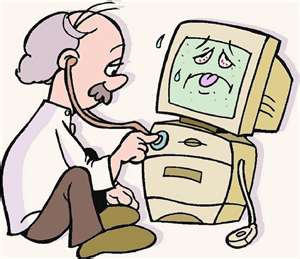Like every other machine, a computer heats up a little while you use it. The heat produced is blown away through the air vents by natural convention, or forced convention, depending if the electric powered fan is off or not. Electric components are mounted on innovative fin designs that help with dissipating heat energy. Transistors in computer and video chips also add to the heat your computer emits. If you have been using a computer for a long time you should be able to tell when your computer is overheating.
Causes of overheating
Overheating may be due to bad cooling design—this rarely occur nowadays. Gaming also triggers overheating. Severely multi-tasking the computer makes the CPU operate at high capacity and this generates a huge amount of heat in the process. Using your computer in a high temperature environment adds up to the heat energy an average computer produces already and can lead to overheating as well.Signs of overheating
At high temperature, fail safe software, shuts down your computer to prevent damage. Blue Screen and frequent memory errors are some of other symptoms of an overheating computer. A simple sign to look out for is constant or frequent fan operation. You can also use a program like Speedfan to monitor your CPU and video card temperatures.How to Fix an Overheating Computer
The best way to fix an overheating computer is by reporting such problem to the manufacturer. That is, if you're still under a warranty. A warranty is suppose to protect you, the costumer, from any problem you may encounter while making good use of your computer over a given period of time. In severe cases, your computer manufacturer will either fix the problem or get you a new machine.If you're using a laptop, a laptop cooler may serve a good purpose. Laptop coolers are electrically powered devices that consist of a fan and seat for your laptop. For desktops, some people prefer removing the cover of the casing. While this might improve ventilation, it's not a good way to fight computer overheating as it exposes the internal components of your computer to dust.
You can also disassemble and clean up clogged air vents and pathways of your computer. This is delicate, especially to people of less computer experience, as this exercise may affect the functionality of a computer. The best thing to do, if you're under a warranty, is to report to the nearest manufacturer's servicing centre around you. It's important to note, disassembling your computer or any other electronic product, under warranty, could terminate the warranty agreement.
Before you disassemble your computer, here're some few useful tips: First, try reducing screen brightness. This may help. In addition, there're software programs that can be of help too. If you're using DELL, you may want to control the thermal management by using precision fan control utility. Other free software programs are also available online. It's important to add, these software programs are written by people who have no link whatsoever to any computer manufacturer in the world, so it makes common sense to exercise caution with these and only used highly trusted and recommended software.


No comments:
Post a Comment